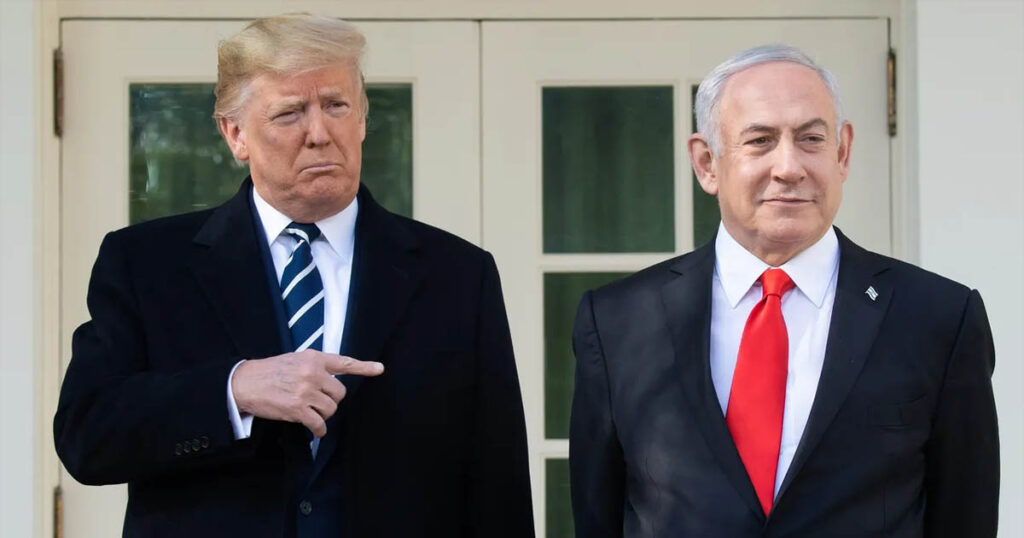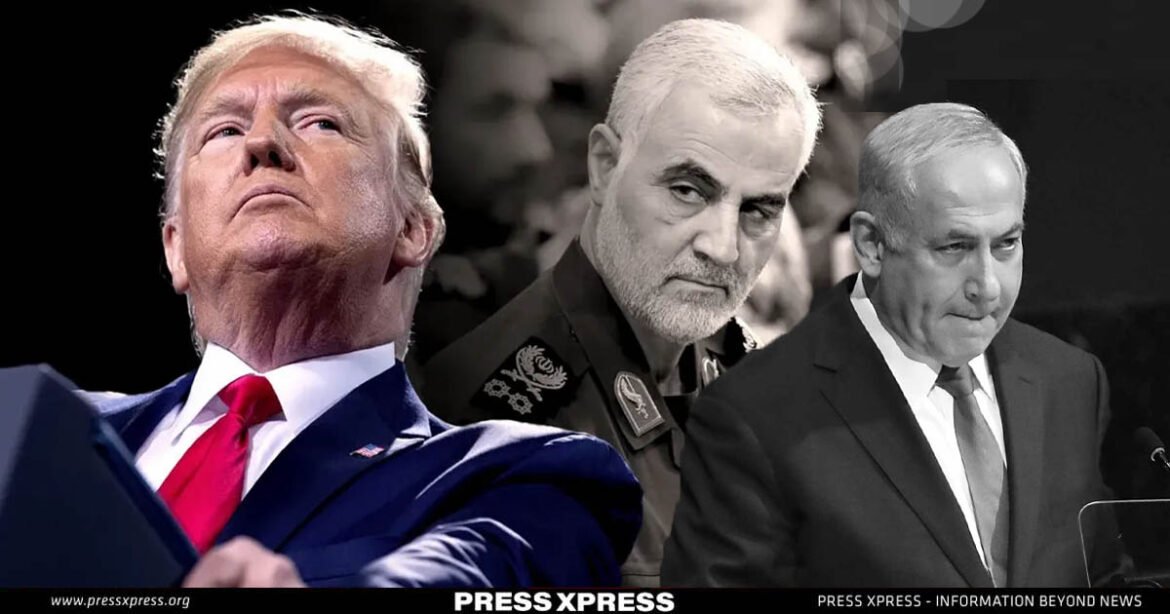Trump’s unpopular candor unveils the duplicity inherent in America’s global political actions. They and their allies often appear to contradict their professed principles when it comes to countries worldwide, particularly in matters of promoting democracy and safeguarding human rights.
Former President Donald Trump has revised his previous stance on Israel, retracting his earlier criticism. While facing pressure from his supporters, he assured Iowa voters on the past Monday that he has consistently been in support of the enduring alliance with Israel in its conflict with Hamas.
You Can Also Read: Freedom of Speech: American Hypocrisy Exposed in Israel
In a previous instance, Trump had criticized Israeli Prime Minister Benjamin Netanyahu following a Hamas attack in Israel on October 7. He had even lauded Hezbollah as ‘very smart’ and insinuated that he could have gained political advantage from the attack, which tragically claimed the lives of 1,200 individuals, had the last election not been “rigged,” implying that he would have remained the American president, and such events would not have occurred.
The former president has openly acknowledged the allegations against Netanyahu, claiming that the Israeli leader withdrew at the eleventh hour from participating in the 2020 US airstrike that targeted the Iranian intelligence chief Qassem Soleimani in Iraq. Trump had previously expressed frustration regarding what he saw as disloyalty on the part of the Israeli leader, and it ultimately contributed to his electoral defeat.
Nevertheless, shortly after a federal judge issued a limited gag order against the former president, who is also the 2024 Republican presidential nominee, Trump exhibited a bit more restraint concerning the charges and the four criminal cases pending against him.
Challenging the gag order, which specifically pertains to federal charges related to the 2020 election, Trump asserted, “We will appeal it, and we will see.”
During a subsequent speech, ostensibly focused on national security, Trump reaffirmed his commitment to continuing his presidential campaign and went as far as to declare, “I am ready to face incarceration if that’s what it takes to restore our nation and reinstate democracy.”
Criticism of Trump’s Speech
Donald Trump’s rivals in the competition for the Republican presidential nomination have spent several days condemning his remarks concerning Israel, arguing that these comments undermine a crucial ally during a time of crisis and could potentially embolden Iran.
However, some expressed disappointment in his apparent admiration for Hezbollah, the Lebanese militia group with a hostile stance toward Israel. Former New Jersey Governor Chris Christie, a prominent figure in the campaign critiquing Trump’s fitness for office, remarked, “He’s displaying idiocy. Only a fool would utter such statements.”
Christie went on to say, “Only a fool would make statements that could provide support and encouragement to Israel’s adversaries under these circumstances. This is a person who seems to care not for the American people or the people of Israel but primarily for his own reflection when he gazes in the mirror each morning.”
In an attempt to mitigate the growing controversy, the former president issued a statement on Thursday evening, in which he asserted that “there is no better friend or ally to Israel than himself.” He went on to accuse President Joe Biden of displaying weakness and incompetence, stating, “Once President Trump is back in office, Israel and everyone else will be secure again!”
Florida Governor Ron DeSantis accused Trump of launching a “verbal attack” on Israel, emphasizing that “this is not the right moment to engage in what Donald Trump did, criticizing Prime Minister Bibi Netanyahu, censuring Israel’s defense minister, and lauding Hezbollah as ‘very smart.'” DeSantis made these remarks in New Hampshire and added, “Now is not the time to air personal grievances against the Israeli Prime Minister.”
Former Vice President Mike Pence criticized Trump’s foreign policy, even though he had been part of the former president’s administration that frequently challenged American values.
Biden’s Quest for Equilibrium
President Biden is navigating the delicate task of achieving a balance. He has exhibited unprecedented support for Israel compared to recent U.S. presidents, acknowledging Israel’s need to respond and regain its sense of security after the most significant breach of its borders and national stability in half a century. However, he is concurrently conveying both public and private messages to Prime Minister Netanyahu, urging Israel to ensure that its response remains within the bounds of international laws of war and to contemplate the potential humanitarian repercussions of a Gaza invasion. This approach is aimed at averting an escalation of the conflict into a perilous regional crisis that could potentially involve the United States.
Critics of Biden’s foreign policy have valid concerns, questioning whether his hands-off approach to the Israeli-Palestinian conflict implies a disregard for the threat posed by Hamas. They also argue that his efforts to initiate dialogues with Iran, the primary sponsor of the militant group, have emboldened the Islamic Republic and endangered Israel’s security. Nevertheless, Biden is crafting a distinct contrast in temperament and perspective when compared to Trump, a distinction that will be central to his campaign narrative if the 2024 election mirrors the dynamics of 2020. The fundamental question for voters would then be: Is Trump suited for the Oval Office?

Trump Singled Out Netanyahu
During an appearance on Fox News last Wednesday, Trump took aim at Netanyahu, characterizing him as having been “severely impacted” by the recent attack. Trump went on to state, “He and Israel were unprepared.” While Trump’s remarks weren’t necessarily unfounded, it was clear that Israel’s intelligence and political shortcomings would be subject to scrutiny following the conflict. Trump’s willingness to criticize Netanyahu, despite the Israeli leader’s extensive efforts to align himself politically with the former president, underscores Trump’s perception that loyalty is often a one-way street for him, and those who cross him risk public censure.
This isn’t the first instance of Trump seemingly leveraging his foreign policy positions, particularly concerning Israel, for political gain. In the past October, he expressed dissatisfaction with American Jews for what he considered insufficient gratitude for actions like relocating the U.S. embassy from Tel Aviv to Jerusalem during his presidency.
In a statement on his Truth social network, Trump asserted, “No president has been more supportive of Israel than myself. “He also remarked that it was somewhat surprising that “our fantastic evangelicals exhibit more gratitude than individuals of the Jewish faith, particularly Jewish citizens of the United States.” His comments were criticized for employing anti-Semitic undertones to demand loyalty from American Jews, an assertion that was refuted by the White House, which stated that he had insulted both Jews and Israelis.
Trump’s Comments on Hezbollah and Other World Leaders
Trump’s comments made on Wednesday regarding Hezbollah, an organization with the capability to inflict further devastation on Israel, appeared inappropriate given the circumstances. During a political event in Florida, he remarked, “They’re ruthless, and they’re shrewd. They’re incredibly ruthless because we’ve witnessed a level of brutality that’s unparalleled.” This statement aligned with his pattern of lauding foreign adversaries he perceives as strong, even if they govern with an iron hand, disregard fundamental humanitarian values, and are adversarial to the United States. Trump has consistently exhibited his admiration for leaders like Chinese President Xi Jinping and the North Korean dictator Kim Jong Un. Moreover, he has added to his extensive history of praising Vladimir Putin, who stands accused of war crimes due to atrocities committed during the conflict in Ukraine, by recently labeling the Russian leader as “a genius.”
During his time in office, Trump frequently appeared willing to prioritize his political advantage over national interests. A notable example was his stance during a summit with Putin in Helsinki when he aligned himself with Putin’s rejection of U.S. intelligence conclusions that Russia had interfered in the 2016 election in an effort to assist him.


